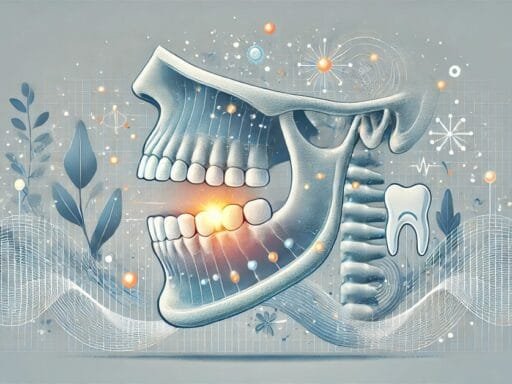1. Introduction
If you’ve ever experienced a toothache that seems to echo through your head, you may have asked yourself, “Can toothache cause headache?” This question often arises when dental discomfort spreads beyond the mouth, affecting other areas like the temples or forehead. The surprising link can be found in the detailed interplay between oral health and neural pathways.
Pain originating in your teeth can travel through shared pain pathways, impacting nearby areas due to the involvement of cranial nerves. For many, this connection explains why a simple dental issue can lead to significant discomfort elsewhere in the body.
This blog will delve into the question, “Can toothache cause headache?”, examining the biological processes, identifying dental issues that may cause headaches, and outlining ways to manage and prevent them. By understanding how tooth pain is linked to broader health concerns, you’ll gain valuable insights into managing and avoiding such problems in the future.
Table of Contents
- 1. Introduction
- 2. The Connection Between Toothaches and Headaches
- 3. Common Dental Issues That May Lead to Headaches
- 4. Symptoms to Watch For
- 5. How to Address Toothache-Induced Headaches
- 6. When to See a Dentist
- 7. Frequently Asked Questions (FAQ)
- 8. Conclusion
2. The Connection Between Toothaches and Headaches

To answer the question, “Can toothache cause headache?”, we must first understand the biological and neurological relationship between these two types of pain. The trigeminal nerve, one of the largest and most intricate cranial nerves, serves as the primary connection. This nerve transmits sensory information from the face, including the teeth and jaw, to the brain. When dental issues arise—such as cavities, infections, or gum inflammation—they can irritate the trigeminal nerve, causing pain signals that radiate to the head.
One significant factor in this connection is the concept of referred pain, where discomfort originating in one area, such as a tooth, is felt in another, like the temples or forehead. For example, a deep dental abscess in the upper jaw can create a throbbing sensation that closely resembles a headache. Similarly, sinus infections caused or worsened by dental problems can exert pressure on oral nerves, leading to head pain that often mimics migraine symptoms.
The overlapping pain pathways between the teeth and the head further complicate this relationship. This shared network explains why a localized toothache can transform into a broader and more persistent headache. By exploring these mechanisms, it becomes evident that the answer to “Can toothache cause headache?” is an absolute yes, highlighting the importance of tackling dental issues quickly to avoid escalating pain.
3. Common Dental Issues That May Lead to Headaches

Dental problems can significantly impact overall well-being, and their connection to headaches is more common than many realize. Understanding these issues can help address the question, “Can toothache cause headache?” Here are some of the most common culprits:
- Cavities, Tooth Decay, and Infections
Untreated tooth decay or a dental infection can lead to severe jaw pain and even radiating headaches. When the decay reaches the nerves, it irritates the trigeminal nerve, resulting in pain that spreads beyond the teeth. - TMJ (Temporomandibular Joint) Disorders
This joint, known as the temporomandibular joint, links the jawbone to the skull. Issues with this joint can cause grinding teeth, jaw misalignment, and tension headaches. Among the reasons toothaches can cause headaches, TMJ disorders are frequently cited due to the strain they place on surrounding muscles. - Bruxism (Teeth Grinding)
Clenching or grinding teeth during sleep can strain the jaw and lead to both jaw pain and persistent headaches. This condition often goes unnoticed until symptoms escalate. - Wisdom Teeth Complications
Impacted or infected wisdom teeth can cause intense discomfort, swelling, and pressure in the jaw. These symptoms often translate into throbbing headaches, making it another clear link when asking, “Can toothache cause headache?”
By recognizing and addressing these dental issues, you can prevent or alleviate headaches caused by oral health problems. Addressing the root cause is essential for lasting relief.
4. Symptoms to Watch For

If you’ve been wondering, “Can toothache cause headache?”, recognizing the associated symptoms can help you pinpoint the problem. These signs often overlap with dental and cranial pain, making diagnosis crucial.
- Types of Headaches
Dental-related headaches often manifest as tension headaches or even mimic migraines. They may feel like a dull ache or sharp pain, depending on the underlying issue. - Warning Signs
Key symptoms include jaw stiffness, facial tenderness, or sinus pressure. Swelling near the jaw or cheeks often accompanies these conditions, especially when linked to infections or impacted teeth.
By understanding these warning signs, you can take proactive steps toward treatment. Addressing these symptoms early can help resolve the discomfort caused by dental problems, effectively answering the question, “Can toothache cause headache?”
ALSO READ
Pressure Pain on Root Canal Tooth: Common Causes and Treatments
Top Ways to Relieve Pain After Tooth Extraction
Powerful Home Remedies for Tooth Extraction Pain Relief: Discover Natural Relief
Effective Remedies for Root Canal Pain: Expert Tips for Quick Relief
Wisdom Teeth Extraction Recovery: Expert Tips for Managing Pain and a Smooth Healing Process
5. How to Address Toothache-Induced Headaches

The connection between toothaches and headaches can cause significant discomfort, but addressing the issue is both achievable and essential. For anyone asking, “Can toothache cause headache?”, the answer lies in effective strategies that provide relief and prevent future occurrences. Here’s how you can manage these pains:
Immediate Remedies for Quick Relief
When a headache caused by a toothache strikes, immediate action can help reduce the pain:
- Over-the-counter pain relief: Medications like ibuprofen or acetaminophen are effective at alleviating both the headache and the tooth pain contributing to it. These remedies are temporary but essential for managing symptoms until a professional assessment is possible.
- Cold compress: Applying a cold compress to the side of the face where the toothache is most severe can help reduce inflammation and numb the area, providing fast relief for both dental discomfort and associated headaches.
These immediate remedies offer temporary comfort while you address the underlying causes of the problem.
Long-Term Solutions for Lasting Comfort
For a long-term fix, it’s crucial to treat the root cause of the issue:
- Regular dental checkups: Preventive care through routine dental visits can catch problems like cavities, tooth decay, or gum infections early, stopping them from escalating into severe pain and headaches.
- Treatments for infections: If an abscess or gum disease is the culprit, professional dental treatment such as antibiotics, drainage, or even root canal procedures may be required to fully resolve the issue.
- Orthodontic care: Misaligned teeth or TMJ disorders can create significant jaw strain, leading to headaches. Orthodontic solutions like braces or aligners can correct alignment and reduce the associated pain.
Lifestyle Changes for Prevention
Preventing headaches caused by toothaches requires consistent attention to your dental health:
- Maintain oral hygiene: Strong oral care tips, including brushing twice daily, flossing, and using mouthwash, can prevent tooth decay and gum disease.
- Reduce teeth grinding: Bruxism, or grinding teeth, is a common cause of jaw strain and headaches. Using a night guard or managing stress can reduce grinding and its effects.
- Adopt a tooth-friendly diet: Limiting sugary foods and drinks can protect teeth from cavities, reducing the likelihood of dental-related headaches.
Addressing the question, “Can toothache cause headache?”, requires a combination of immediate relief, professional care, and preventative measures. By taking these steps, you can alleviate pain and protect your dental health, ensuring a headache-free future.
6. When to See a Dentist

Knowing when to seek professional help is essential if you’re dealing with persistent discomfort. For those asking, “Can toothache cause headache?”, You’ll often recognize the issue when the pain doesn’t go away and progressively worsens. Here are the key signs that it’s time to consult a dentist:
Persistent Pain, Swelling, or Fever
If your toothache persists for more than a day or two, or if the pain is severe enough to cause headaches, it’s crucial to seek a dental visit. Additional symptoms such as facial swelling, fever, or difficulty chewing are indicators of a deeper issue, such as a dental infection or abscess, which could spread if left untreated.
The Risks of Delayed Treatment
Delaying treatment for dental problems can exacerbate both the chronic pain and the headaches they cause. For example, untreated tooth decay or gum disease can lead to complications like abscesses or TMJ disorders, which can amplify head pain. If you’re still wondering, “Can toothache cause headache?”, it may be time to visit your dentist and address the root cause before it impacts your overall health.
Consulting a Specialist
A dentist can accurately diagnose and treat the dental issue causing your discomfort. They may recommend antibiotics for infections, a root canal for severely damaged teeth, or orthodontic care for alignment issues. Timely dentist consultation not only resolves immediate symptoms but also prevents recurring problems.
Taking prompt action can make all the difference. By recognizing when professional help is necessary, you’ll protect both your oral health care and your overall well-being. The next time you find yourself asking, “Can toothache cause headache?”, let that question guide you straight to your dentist.
7. Frequently Asked Questions (FAQ)
Why does a toothache trigger headaches?
Many people ask, “Can toothache cause headache?” The answer lies in the shared network of oral nerves and cranial nerves, particularly the trigeminal nerve, which transmits pain signals from the teeth to the head. When dental issues like infections or cavities irritate this nerve, the resulting pain can radiate to the head, causing headaches.
Can wisdom teeth removal relieve headaches?
Yes, wisdom teeth removal can relieve headaches if the teeth are impacted, infected, or causing significant pressure on the jaw and surrounding nerves. Many wonder, “Can toothache cause headache from wisdom teeth issues?” In these instances, extracting the affected teeth typically relieves both dental and headache discomfort.
What natural remedies work for toothache-related headaches?
Natural remedies like applying a cold compress, rinsing with saltwater, or using clove oil can provide temporary relief for both chronic headaches and tooth pain. However, these solutions are short-term and should be followed by a visit to a dentist to address the root cause.
8. Conclusion
So, can toothache cause headache? The evidence is clear—dental issues can directly trigger head pain due to shared nerve pathways. By maintaining good oral hygiene, seeking timely care, and addressing dental problems early, you can prevent unnecessary discomfort and protect your overall well-being. Proactive care is the key to a pain-free future.






